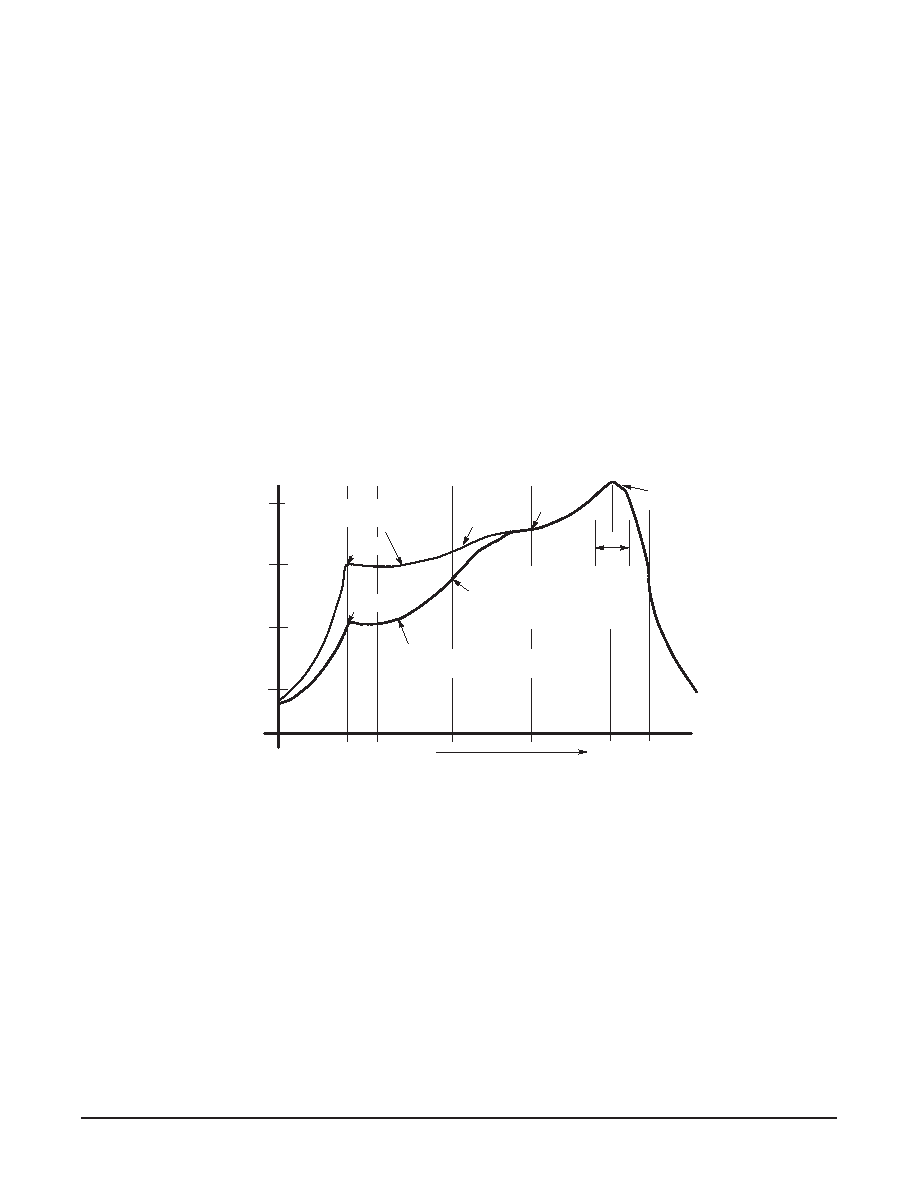- 您现在的位置:买卖IC网 > PDF目录295140 > BDX33BBU (ON SEMICONDUCTOR) 10 A, 80 V, NPN, Si, POWER TRANSISTOR PDF资料下载
参数资料
| 型号: | BDX33BBU |
| 厂商: | ON SEMICONDUCTOR |
| 元件分类: | 功率晶体管 |
| 英文描述: | 10 A, 80 V, NPN, Si, POWER TRANSISTOR |
| 封装: | PLASTIC, TO-220AB, 3 PIN |
| 文件页数: | 14/61页 |
| 文件大小: | 360K |
| 代理商: | BDX33BBU |
第1页第2页第3页第4页第5页第6页第7页第8页第9页第10页第11页第12页第13页当前第14页第15页第16页第17页第18页第19页第20页第21页第22页第23页第24页第25页第26页第27页第28页第29页第30页第31页第32页第33页第34页第35页第36页第37页第38页第39页第40页第41页第42页第43页第44页第45页第46页第47页第48页第49页第50页第51页第52页第53页第54页第55页第56页第57页第58页第59页第60页第61页

Surface Mount Package Information and Tape and Reel Specifications
4–4
Motorola Bipolar Power Transistor Device Data
TYPICAL SOLDER HEATING PROFILE
For any given circuit board, there will be a group of control
settings that will give the desired heat pattern. The operator
must set temperatures for several heating zones and a figure
for belt speed. Taken together, these control settings make
up a heating “profile” for that particular circuit board. On
machines controlled by a computer, the computer remem-
bers these profiles from one operating session to the next.
Figure 5 shows a typical heating profile for use when
soldering a surface mount device to a printed circuit board.
This profile will vary among soldering systems, but it is a
good starting point. Factors that can affect the profile include
the type of soldering system in use, density and types of
components on the board, type of solder used, and the type
of board or substrate material being used. This profile shows
temperature versus time. The line on the graph shows the
actual temperature that might be experienced on the surface
of a test board at or near a central solder joint. The two
profiles are based on a high density and a low density board.
The Vitronics SMD310 convection/infrared reflow soldering
system was used to generate this profile. The type of solder
used was 62/36/2 Tin Lead Silver with a melting point
between 177 –189
°C. When this type of furnace is used for
solder reflow work, the circuit boards and solder joints tend to
heat first. The components on the board are then heated by
conduction. The circuit board, because it has a large surface
area, absorbs the thermal energy more efficiently, then
distributes this energy to the components. Because of this
effect, the main body of a component may be up to 30
degrees cooler than the adjacent solder joints.
STEP 1
PREHEAT
ZONE 1
“RAMP”
STEP 2
VENT
“SOAK”
STEP 3
HEATING
ZONES 2 & 5
“RAMP”
STEP 4
HEATING
ZONES 3 & 6
“SOAK”
STEP 5
HEATING
ZONES 4 & 7
“SPIKE”
STEP 6
VENT
STEP 7
COOLING
200
°C
150
°C
100
°C
50
°C
TIME (3 TO 7 MINUTES TOTAL)
TMAX
SOLDER IS LIQUID FOR
40 TO 80 SECONDS
(DEPENDING ON
MASS OF ASSEMBLY)
205
° TO 219°C
PEAK AT
SOLDER JOINT
DESIRED CURVE FOR LOW
MASS ASSEMBLIES
100
°C
150
°C
160
°C
170
°C
140
°C
Figure 4. Typical Solder Heating Profile
DESIRED CURVE FOR HIGH
MASS ASSEMBLIES
相关PDF资料 |
PDF描述 |
|---|---|
| BDX54B | Complemetary Silicon Power Darlington Transistors(功率达林顿晶体管) |
| BDX54C | Complemetary Silicon Power Darlington Transistors(功率达林顿晶体管) |
| BDX54F | Complementary Silicon Power Darlington Transistors(互补硅功率达林顿晶体管) |
| BF304-0PB-006B | SINGLE COLOR DISPLAY CLUSTER, SUPER BLUE, 9 mm |
| BF304-0PB-130B | SINGLE COLOR DISPLAY CLUSTER, SUPER BLUE, 9 mm |
相关代理商/技术参数 |
参数描述 |
|---|---|
| BDX33BG | 功能描述:达林顿晶体管 10A 80V Bipolar Power NPN RoHS:否 制造商:Texas Instruments 配置:Octal 晶体管极性:NPN 集电极—发射极最大电压 VCEO:50 V 发射极 - 基极电压 VEBO: 集电极—基极电压 VCBO: 最大直流电集电极电流:0.5 A 最大集电极截止电流: 功率耗散: 最大工作温度:+ 150 C 安装风格:SMD/SMT 封装 / 箱体:SOIC-18 封装:Reel |
| BDX33B-S | 功能描述:达林顿晶体管 80V 10A NPN RoHS:否 制造商:Texas Instruments 配置:Octal 晶体管极性:NPN 集电极—发射极最大电压 VCEO:50 V 发射极 - 基极电压 VEBO: 集电极—基极电压 VCBO: 最大直流电集电极电流:0.5 A 最大集电极截止电流: 功率耗散: 最大工作温度:+ 150 C 安装风格:SMD/SMT 封装 / 箱体:SOIC-18 封装:Reel |
| BDX33C | 功能描述:达林顿晶体管 NPN Epitaxial Sil RoHS:否 制造商:Texas Instruments 配置:Octal 晶体管极性:NPN 集电极—发射极最大电压 VCEO:50 V 发射极 - 基极电压 VEBO: 集电极—基极电压 VCBO: 最大直流电集电极电流:0.5 A 最大集电极截止电流: 功率耗散: 最大工作温度:+ 150 C 安装风格:SMD/SMT 封装 / 箱体:SOIC-18 封装:Reel |
| BDX33C | 制造商:STMicroelectronics 功能描述:TRANSISTOR DARLINGTON TO-220 |
| BDX33CG | 功能描述:达林顿晶体管 10A 100V Bipolar Power NPN RoHS:否 制造商:Texas Instruments 配置:Octal 晶体管极性:NPN 集电极—发射极最大电压 VCEO:50 V 发射极 - 基极电压 VEBO: 集电极—基极电压 VCBO: 最大直流电集电极电流:0.5 A 最大集电极截止电流: 功率耗散: 最大工作温度:+ 150 C 安装风格:SMD/SMT 封装 / 箱体:SOIC-18 封装:Reel |
发布紧急采购,3分钟左右您将得到回复。